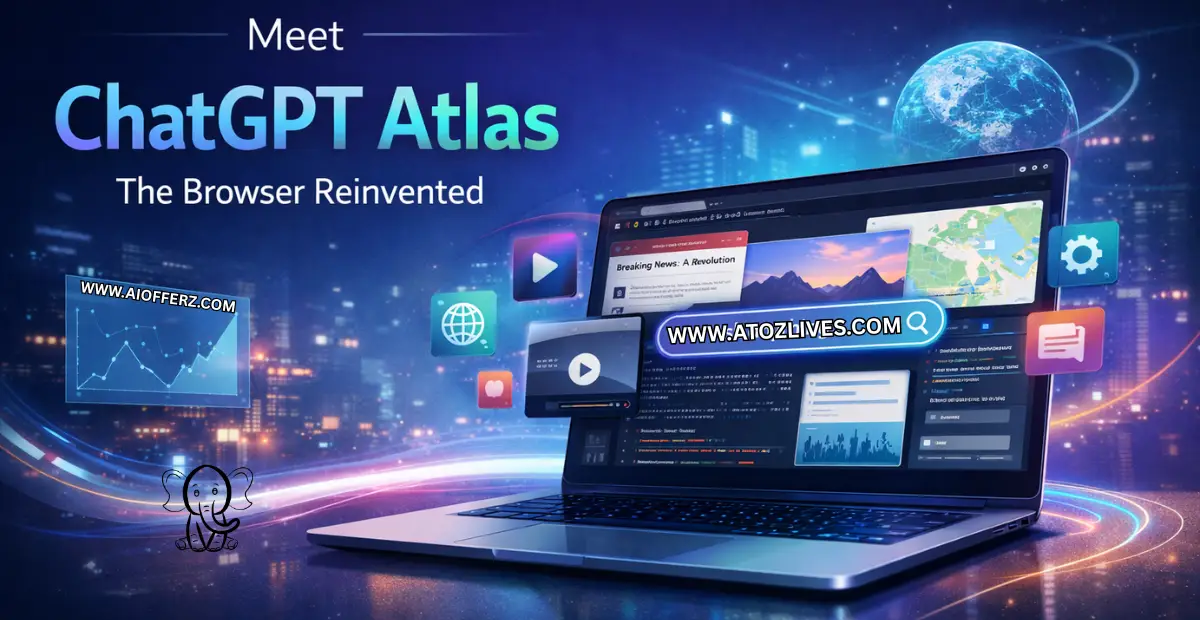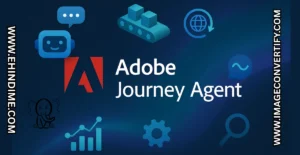Today in this post we will learn about Meet ChatGPT Atlas: The Browser Reinvented for the AI Era.
On October 21 2025, OpenAI quietly turned a corner in how we experience the web. The company unveiled ChatGPT Atlas a web browser built from the ground up around its flagship chatbot ChatGPT.
The headline: your browser is no longer just a tool for navigating websites it is now a fully-equipped assistant that lives alongside you as you surf, read, research, write and more.
Why does this matter? Because the browser has long been the gateway to our digital lives and this launch signals a shift from static tabs and search bars to conversational task-oriented interaction. OpenAI CEO Sam Altman described Atlas as a “once-in-a-decade opportunity to rethink what a browser can be about.”
What Is ChatGPT Atlas?
At its core, ChatGPT Atlas is a Chromium-based browser (meaning it builds on the engine that powers Google Chrome) that deeply integrates ChatGPT into every aspect of the browsing experience.
Axios+2
AI News Hub+2
When you install it on macOS (launching globally for Mac users on Oct 21) you will get the familiar browsing layout tabs, address bar, search but with a major upgrade: ChatGPT sits within the browser itself, ready to assist you in the same window you are browsing.
Some of the major features at launch include:
ChatGPT sidebar or chat panel: On any page, you can bring up ChatGPT, ask about what you are seeing, ask it to summarise a long article, extract key points, compare products all without toggling away to a different tab.
In-line writing assistance: Within forms, documents or any text field. You can invoke ChatGPT to help you draft or edit content. This is right inside the page you are on.
Browser memories: Optional feature where Atlas remembers key context from your browsing to help with follow-up tasks. For example, if you were researching job postings last week, ChatGPT could pull those up and summarise trends for you. Of course, you are in full control these memories can be viewed, archived, deleted.
Agent mode: For paid-tier users (Plus, Pro, Business), ChatGPT can act more autonomously doing things for you across the web: research, adding items to a shopping cart, maybe even planning your trip. At launch the agent mode is in preview.
Importantly, Atlas prioritises privacy: you choose whether to enable browsing memory, you can delete history and you can use incognito mode. OpenAI emphasises you remain in control of what the AI sees and what is remembered.
Are You Ready To Get Paid To Review Apps On Your Phone Then Try It…
How ChatGPT Atlas Works (From a User Perspective)
Imagine this scenario: you are reading an in-depth article on climate technologies. Instead of opening a new tab and pasting text into ChatGPT, you simply click the ChatGPT sidebar within Atlas. You ask: “Summarise this article and compare the five technologies mentioned with what we saw last month.” ChatGPT, thanks to the browser memories, knows you were reading similar material last week and can pull that context in.
Alternatively, say you are shopping for a laptop. You open a product page, highlight the specs and ask “What are the trade-offs here? Are these specs worth the price compared with the model I looked at two days ago?” ChatGPT will pull in previous pages, use your browsing context and give a recommendation right inside the same tab.
If you are on a form drafting an email, you can press a small ChatGPT icon, highlight the text and ask “Make this sound more professional”. Instantly it rewrites the text inline, no copy-paste needed. Atl as also supports tabs for images, news, search links; you ask ChatGPT to navigate these tabs and pull you results.
The “agent mode” stretches the experience further: you could say, “Plan a weekend in Goa: find flights, hotels, create an itinerary, book the hotel, set a reminder.” ChatGPT will use its agent mode to go off, navigate the web, pick options, propose them to you, ask for approval and execute actions all while you stay in the browser.
From a technical standpoint, because it is built on Chromium, it retains compatibility with existing web standards, browser extensions (to some extent) and most websites.
In this post we are learning about Meet ChatGPT Atlas: The Browser Reinvented for the AI Era.
Why This Launch Matters
1. A Shift from Search to Task-Completion
Historically, browsers and search engines have followed the pattern: user types query → engine returns list of links → user clicks into one → reads content → returns or tweaks query. ChatGPT Atlas is attempting to collapse much of that process. You stay in your context; ChatGPT does the heavy lifting. In other words: less link hopping, more direct answers and action. This represents a major shift in how we use the web.
2. Putting ChatGPT at the Center of Browsing
OpenAI already has hundreds of millions of users using ChatGPT. By embedding ChatGPT into the browser, they are anchoring the browsing experience around their AI rather than traditional search engines or tab-based browsing. It is a way to deepen user engagement, broaden stickiness and build a new mode of web interaction.
3. Challenging Browser Dominance & Search Models
The biggest incumbent in this space is Google Chrome (and to a lesser extent Edge, Safari). With ChatGPT Atlas, OpenAI signals that it is no longer satisfied with being a chatbot on the side. It wants to be the environment. The move also touches on search engine economics: if users spend less time clicking into web links and more time being served directly inside ChatGPT, it could disrupt traffic flows, advertising models and content monetisation. Reuters captured the potential: OpenAI hopes to capitalise on its ~800 million weekly ChatGPT users via the browser
4. Productivity & Workflows Re-imagined
For professionals, students, writers, analysts ChatGPT Atlas promises to streamline tasks that previously required switching contexts, juggling tabs, copy-pasting. The browser becomes a productivity hub: browsing, chatting, writing, automating. The value proposition is clear: save time, reduce friction. The early tester quoted by OpenAI said as much: “I used to switch between slides and ChatGPT, taking screenshots… now ChatGPT instantly understands what I am looking at.”
Want To Get Online Cash…
Who It is For – And Who Might Want to Wait
Ideal Users
Students and researchers: The ability to ask questions about web pages, summarise content, track context from prior browsing sessions makes Atlas a strong tool for deep learning and note-taking.
Content professionals / writers / marketers: Inline writing help, summarisation, access to past browsing memory tools to boost workflow.
Knowledge workers with complex browser-based tasks (product comparisons, travel planning, market research): Agent mode enables automation of multi-step tasks.
Early adopters and Mac users: Atlas is available on macOS immediately, so they get first access.
Considerations / Who Might Wait
Windows, iOS, Android users: Launch is Mac-first; support for other platforms is “coming soon.”
Privacy-sensitive users: While the memory features are optional and user-controlled, the browser does collect context if enabled. Users must carefully review settings and decide what they’re comfortable with.
Users comfortable with their current browser and workflows: The benefits are strong but switching browsers always carries effort bookmarks, extensions, habits. If your current setup works fine, you might wait for maturity.
Publishers & content creators: There are potential implications for how web traffic and ads work if people spend more time in the browser + chat pane rather than clicking away to sites. This is something to watch.
“Live Chat Jobs – You have to try this one”
What is New & What is Coming
At launch (October 21, 2025) the key platforms and availability are:
MacOS: globally available for Free, Plus, Pro and Go users.
Business users (beta): Atl as is available in beta for Business plans and if enabled, Enterprise/Education users.
Windows, iOS, Android: Versions are under development, promised soon.
Looking forward, we can expect:
A broader rollout: Non-Mac platforms arriving in due course.
More agent-mode capabilities: As the AI matures, agent mode will likely become more capable, reliable and available to more users.
Extension ecosystem, integrations: Since it is Chromium-based, there is potential for compatibility with browser extensions but how OpenAI manages that will matter.
Monetisation & Business Models: While core features are free, advanced capabilities may form part of paid plans. Also, OpenAI may explore new revenue models tied to browsing data/context (with user consent) and enterprise offers.
Competitive responses: Google, Microsoft, Perplexity and others are already working on AI-enhanced browsing experiences; we will see how Atlas stacks up over time.
In this post we are learning about Meet ChatGPT Atlas: The Browser Reinvented for the AI Era.
Potential Impact & Challenges
Impact on the Web Ecosystem
The rise of an AI-first browser could have big ripple effects:
Search behaviour: If users increasingly rely on chat-based answers rather than clicking links, it could alter how search engines and websites operate.
Web traffic flows: Publication sites and content creators may see changes in how traffic is directed and monetised.
Browser competition: Chrome is dominance may face pressure if users switch to Atlas for the AI experience.
Data & privacy: Because the browser has access to context (what you are browsing), questions of optics, transparency and control become more important than ever.
Productivity & workflow change: For individuals and organisations, an AI-integrated browser might become the new standard for how we “get things done online.”
Key Challenges & Open Questions
Platform reach: Launching on Mac first is a logical step but the real test is getting widespread adoption across Windows & mobile platforms.
Reliability of agent mode: Automating tasks in the browser is powerful but also prone to mistakes how well will the early versions perform? How will errors, safety and oversight be managed?
User trust & privacy: Will users trust a browser that “remembers” their browsing behaviour? Will the opt-in control be enough? How transparent will data usage be?
Content creator concerns: If ChatGPT summaries reduce clicks to websites, how will publishers adapt? Will there be new agreements between AI companies and content providers?
Monetisation & business sustainability: OpenAI has significant costs; while the user base is huge, finding the right revenue model remains important. The browser may play a role in that.
AP News
Competition: Google (Chrome + Gemini), Microsoft (Edge + AI), Perplexity (Comet) and others are not standing still. Atlas will need to differentiate and scale to win.
Are You Ready To Get Paid To Review Apps On Your Phone Then Try It…
In Practice: What to Expect as a User
As a Mac user, installing Atlas is straightforward: go to chatgpt.com/atlas, download the macOS version, sign in with your ChatGPT account, import your bookmarks, passwords and history from your current browser if desired.
Once you’re in:
Open a new tab. You will see a search bar or prompt: ask ChatGPT a question or enter a URL.
On any page, click the ChatGPT sidebar (or equivalent icon) and you will have a chat interface referencing the content on the page.
Want to draft/edit text on that page? Highlight it, ask ChatGPT for help.
To enable browser memories: go into settings, toggle the feature, review what it will remember and set exclusions.
For advanced users: If you have a paid plan (Plus/Pro), you can preview agent mode ask ChatGPT to undertake a multi-step task and watch it navigate websites, gather information, return results.
Privacy first: You can clear browsing history, disable memory for specific sites, use incognito, manage what data is used.
Keep your existing extensions? Being Chromium-based means many will work but check compatibility and whether you want to migrate fully to Atlas or run it alongside your current browser for a while.
In this post we are learning about Meet ChatGPT Atlas: The Browser Reinvented for the AI Era.
Verdict: Should You Try It Now?
If you are the kind of user who enjoys exploring new tools, workflows and is comfortable being an early adopter, there is a lot to like about ChatGPT Atlas. The promise of conversational browsing, context-aware assistance and task automation is compelling and it could genuinely change how you work online.
However, if you are perfectly happy with your current browser or you rely on Windows/mobile and wish to wait for stable versions, there is no urgency. There is risk in switching too early: extensions may not yet be fully compatible, agent mode remains preview and the broader ecosystem (mobile, enterprise) is still catching up.
In short: Atlas is more than a browser update it is a vision of the web next phase. If you are curious about what the web might look like five years from now, diving in now gives you firsthand experience. If you prefer stability and familiarity, you can wait and watch how the ecosystem matures.
Want To Get Online Cash…
Final Thoughts
The launch of ChatGPT Atlas is a bold move by OpenAI. It signals that the browser, that often-taken-for-granted tool, is due for reinvention. In a world where AI is increasingly baked into everything from search to productivity apps the browser may become the central stage for our digital lives. Atlas positions ChatGPT not just as a helpful chatbot but as the core of the browsing experience.
There are big questions to answer: how smoothly will agent mode work? How comfortable will users be with AI-enabled browsing context and memory? How will content creators respond to the shift in how people consume information? And will Atlas become a real alternative to Chrome and Edge or simply a niche tool?
For now, one thing is clear: if the browser is the portal to the web, ChatGPT Atlas aims to remake it into something more interactive, more personal and more intelligent. The web as a place to do things more than simply go places. If that vision holds, the way we browse, search, work and create may look very different within a few years.
In this post we have learnt about Meet ChatGPT Atlas: The Browser Reinvented for the AI Era.
About AIOFFERZ.COM
We help professionals and businesses elevate their digital presence with AI. Subscribe for weekly guides on personal branding, design hacks and productivity tools all for free!
Ready to Begin?
➜ Click Here to explore top rated affiliate programs on ClickBank!
➜ Reach Our Free Offers: “Come Here To Earn Money By Your Mobile Easily in 2025.”
Want To Read More Then Click Here…
If You Are Interested In Health And Fitness Articles Then Click Here.
If You Are Interested In Indian Share Market Articles Then Click Here.
Thanks To Visit Our Website-We Will Wait For You Come Again Soon…





